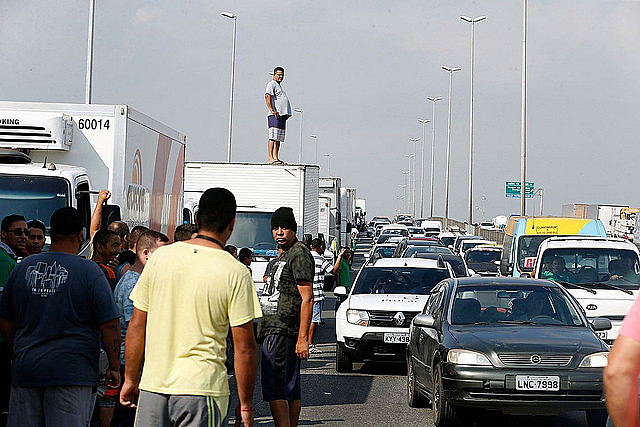As a nationwide trucker strike enters its fifth day in Brazil, impacting several industries across the country, president Michel Temer announced today (25) on live television that he will use the Army, the Air Forces, the Navy, and the Federal Highway Police to remove strikers if they decide to continue to stage road blockades. Truck drivers are protesting against the continuous hikes in fuel prices in the country, especially diesel fuel, which was up 12% in 12 months. The workers want the government to eliminate taxes on diesel, the primary fuel used in freight trucks, as the country’s economy runs largely on road transport.
After five days, the trucker strike has caused food shortages in supermarkets and grocery stores, as well as fuel shortages at gas stations across Brazil, with reports of huge lines, turmoil, and reduced number of buses circulating in several cities.
Last night (24), the government signed a deal with members of road transport unions and associations, but, on Brazilian highways, truck drivers argue they do not feel represented by the deal.
The government offered to eliminate one tax on diesel fuel – the Contribution on Intervention in the Economic Domain (Contribuição de Intervenção no Domínio Econômico – CIDE) – and to lower fuel prices by 10% at refineries for 30 days. However, the Temer administration did not accept one of truck drivers’ main demands: to eliminate two other VAT-like taxes on diesel, called Program of Social Integration (Programa de Integração Social – PIS) and the Contribution for the Financing of Social Security (Contribuição para o Financiamento da Seguridade Social – COFINS).
The Brazilian Association of Truck Drivers (Associação Brasileira dos Caminhoneiros – ABCAM) released a statement today saying the workers will keep striking against the country’s current fuel pricing policy, which includes a 42% tax burden. “Unlike other organizations that claim to represent truck drivers, the ABCAM will not betray the workers. We will stand by our demands,” the statement reads.
A Brazilian government decree to be issued today will authorize federal law enforcement and armed forces to give tickets and arrest truck drivers who do not return to work. Army officers will also be authorized to seize trucks and drive them to their destination if truckers refuse to do so.
In his address to the nation, Temer said “the government had the courage to establish a conversation [with unions], and now it will have the courage to enforce its authority.” The president claimed only a “radical minority” of truck drivers continue to strike after the deal was reached.
Strike
Truck drivers have been staging a nationwide road blockade since Monday (21), causing a shortage crisis in several areas of the country, as products of several industries are not being distributed.
In many cities, people are flocking to gas stations while local governments have reduced the number of buses circulating to tackle a potential fuel shortage.
Fuel shortages are also impacting airports. Recife and Brasília airports have run out of fuel, and at least nine flights have been canceled in Brazil’s capital city.
The strike is also impacting other industry. As truckers are not distributing products, supermarkets and grocery stores are facing shortages. In Rondônia state, 16 thermal power stations are rationing energy and classes have been cancelled in several schools and institutions across the country.
In São Paulo, Brazil’s largest city, 40% fewer buses are circulating off-peak hours due to fuel shortages. The city government declared a state of emergency and filed an injunction on Thursday (24) to guarantee fuel supply for city buses and garbage trucks. The government also asked the court to order a R$1-million-per-day fine (more than US$270,000) against two state unions that are taking part in the protests.




